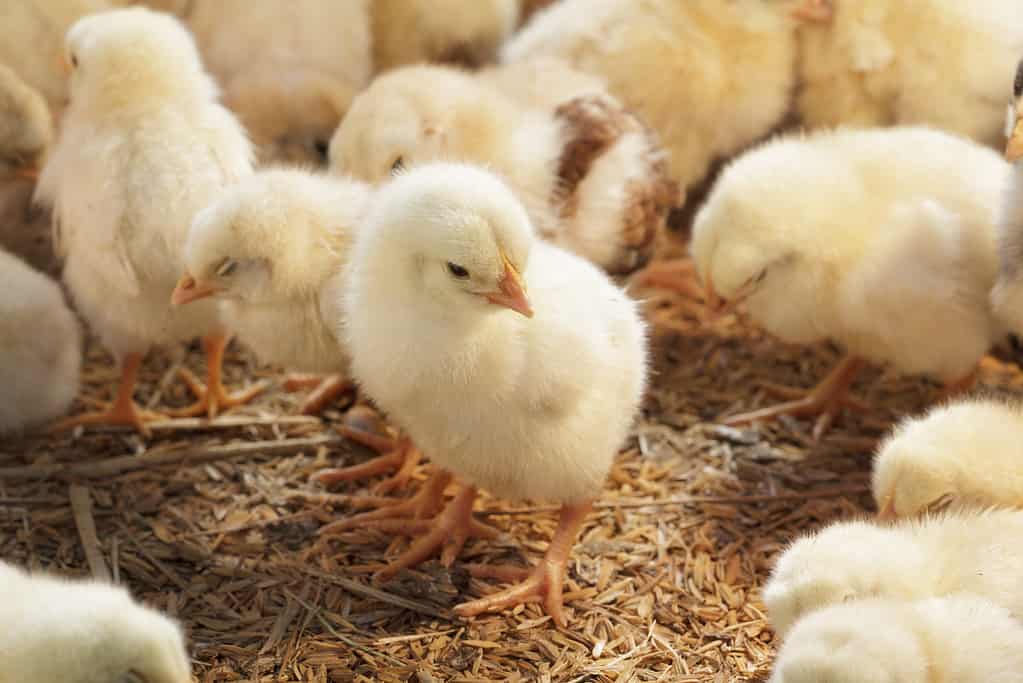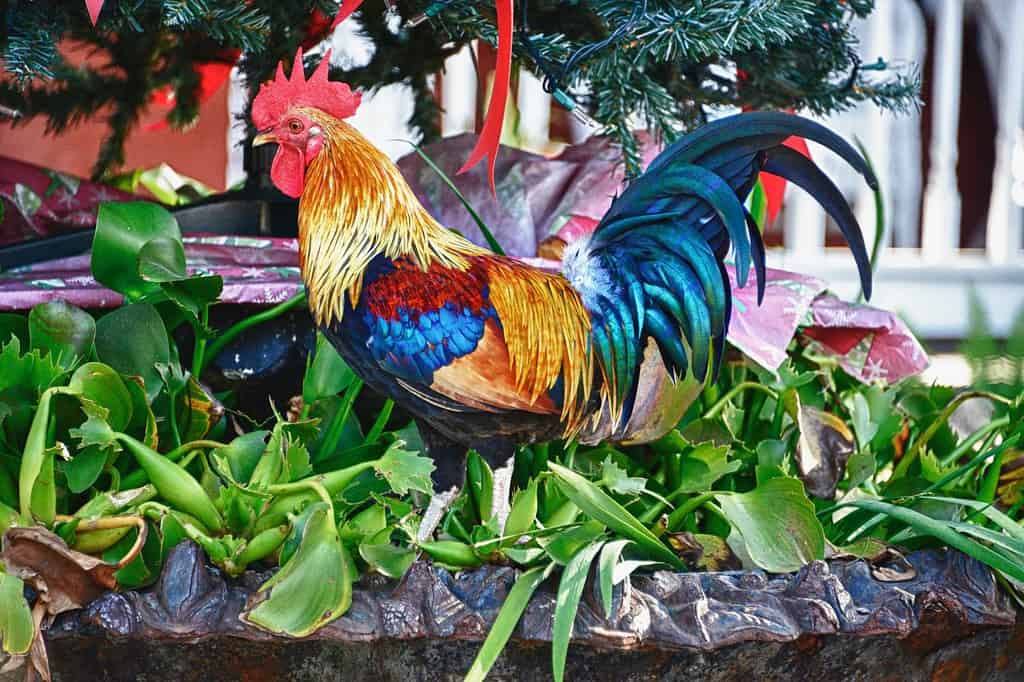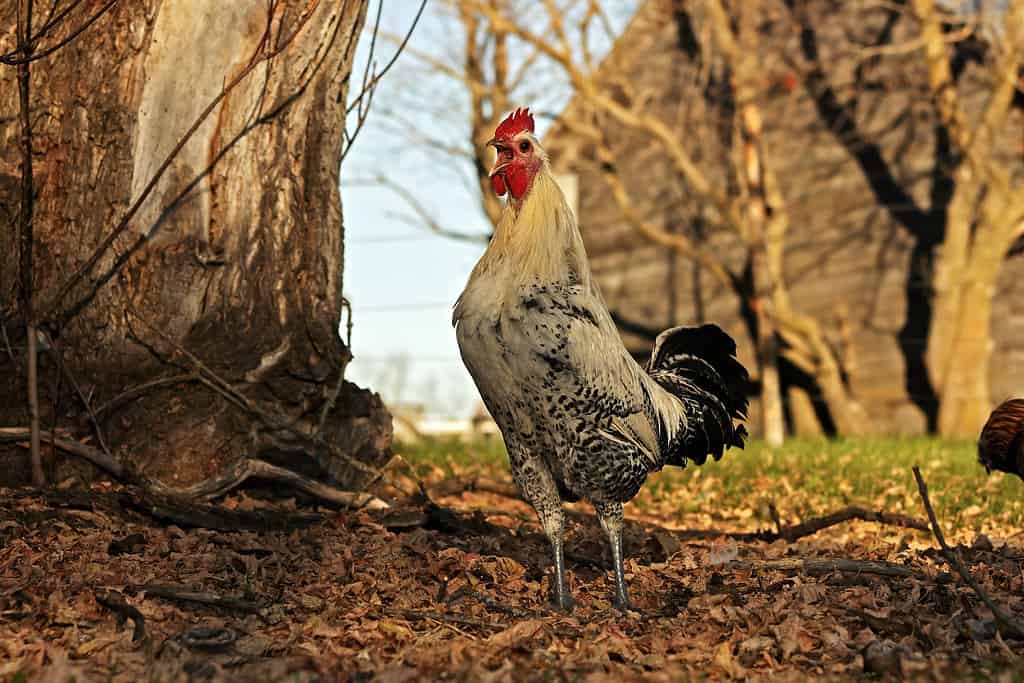If you’ve just hatched a fresh batch of chicks, be it your first or fiftieth, something that never seems to be easy is identifying the roosters from the hens. If you’re someone who prioritizes egg production, this can be a very important differentiation for you. And hey, what’s something that roosters do that hens don’t? Yep, that (sometimes obnoxious) sound of crowing is your key to identifying the gender of your chickens. In this article, we’ll be telling you the timeframe in which roosters start crowing. We’ll also fill you in on why this occurs, and how you can help to encourage healthy development in all of your chickens.
Determining A Rooster From A Hen

The only truly accurate way to tell whether or not a chick is a
rooster
or a hen is to wait for them to start maturing.
©Toa55/iStock via Getty Images
You’re probably wondering whether or not there’s a way to tell if you have a rooster or a hen on your hands before the crowing begins. Unfortunately, this is a bit tougher than you’d like to think. Sure, there are plenty of legendary “tricks” for figuring out whether or not a male or female will pop out of an egg, but those are, as it seems, myths. Whether it’s looking to see if the eggs are pointy or swinging a string around the chick’s head, none of these are going to tell you what gender the creature in question is.
There is one semi-accurate way to tell what gender your chick is before they begin maturing. That said, though, it might not be a skill that you want to take the time to learn. This is called sexing, and it involves taking a close look at the anal vent of a chick. Although you’re reaching about 90% accuracy with this method, there are a few caveats, with the largest being time. You have to do this when the chick is a day old. No more, no less. This can put a bit of a damper on things.
So, how do you possibly separate these two genders? How can one figure it out? Well, it becomes quite simple over time: Hens start to lay eggs, and roosters start crowing!
The Age That Roosters Start Crowing

There is a wide period in which it is considered natural for roosters to start their crowing.
©Joe Dube/Shutterstock.com
The truth is, there is no one solid timeframe for your roosters to start crowing. Much like in humans, there are early and late bloomers. Some roosters might begin crowing as early as three months, while others could take as long as ten. So, a general average can be around six months.
If you’re someone who isn’t looking to have any roosters, and would much prefer hens, wait at least five months before giving away any “roosters” that you suspect to be in the bunch. Something that few people know is that hens crow a bit themselves when they’re incredibly young. If they haven’t physically matured yet, and you can’t see any other visible signs that you have a rooster on your hands, hang onto the chicken for a while longer.
Something else that’s important to note is that there are several external factors that could either delay or speed up how fast your roosters start to crow. These can include anything from:
- The breed of chicken that you’re raising
- Flock size/noise levels
- Nutrition and general health
How You Can Encourage Healthy Rooster Development

While some things are left to nature, there are a few factors in chicken growth that are in your control.
©iStock.com/tatyana_tomsickova
If you want to make sure that your roosters and hens are developing on the right track, there are certainly some variables that lay entirely in your power. Most of these involve simply paying attention! If you notice that time has gone by without any signs of physical development, for instance, take note of that. It’s even helpful to manually take actual notations of their growth and behavior patterns to keep for your records. This way, if something is off, you’ll notice it immediately and be able to implement the proper intervention strategies.
Other things are more obvious; Making sure that the chicks have space to roam, proper socialization, and a balanced diet to name a few. An important factor that some forget to consider is lighting, as proper lighting conditions play a key role in the development of chicks. So long as you handle these things, while also encouraging a sense of stability and routine to maintain low stress levels in your chicks, they should be happily growing in no time at all.
Why Do Roosters Crow?

There are several reasons why roosters crow.
©Tim Belyk/Shutterstock.com
The last bit of information that we’ll leave you with today is why roosters crow. We know that they all do it, almost impulsively, and we’re more than familiar with the sound. But, what is it that drives this behavior in our roosters? It seems that it’s not so much one factor, but rather a culmination of things.
The primary reason why roosters crow is to attract females and intimidate other males. Through crowing, they show dominance and prowess, which seems to be quite attractive to the ladies. Another reason, however, is just to communicate and maintain contact with chickens that are further away. They do this when there are predators nearby, for instance, though those crows have a very distinct kind of screech to them.
No matter the reason, watching a young chick find his voice is a fascinating and powerful experience for any farmer. And hey, with roosters around, you can save some money on a new alarm clock!
The photo featured at the top of this post is © Racheal Carpenter/Shutterstock.com
Thank you for reading! Have some feedback for us? Contact the AZ Animals editorial team.






